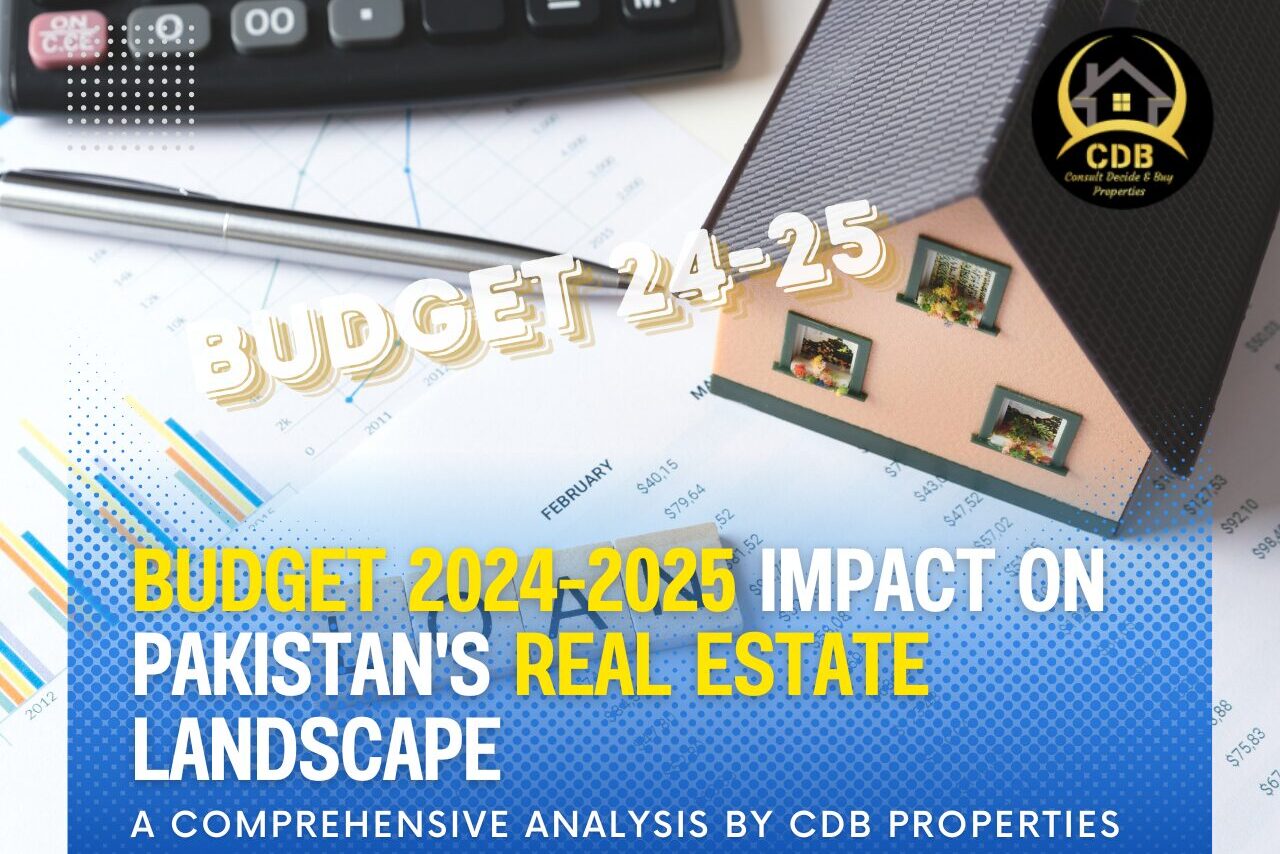
The real estate landscape in Pakistan has always been a significant indicator of the country’s economic health. With each fiscal year, the government introduces new policies and amendments aimed at improving tax compliance, enhancing transparency, and promoting growth within this sector. The Budget 2024-2025 introduces several impactful changes, particularly in the realm of property taxes, that are poised to influence both buyers and sellers in the real estate market.
New Budget Announcements for 2024-25
The Budget 2024-25 has brought forth a series of new regulations and modifications aimed at reshaping the real estate tax landscape in Pakistan. These changes include revised tax rates based on property values, new obligations for sellers, the implementation of the controversial 7-E tax, and significant alterations to the capital gains tax on the sale of securities.
This comprehensive analysis will delve into these aspects, exploring their implications for different stakeholders within the real estate sector.
Property Tax Regulations: Impact on Non-Filers and Late Filers
One of the key highlights of the Budget 2024-25 is its stringent approach towards non-filers and late filers. Non-filers—individuals who do not file their tax returns—have always faced higher tax rates compared to filers. This budget continues that trend, but with an added emphasis on late filers. Late filers are those who delay their tax filing beyond the due date but before the purchase of property. This category now faces tax rates that are higher than those for regular filers but lower than those for non-filers, thereby incentivizing timely tax filing.
Tax Rates for Different Property Value Categories
The new budget delineates clear tax brackets based on property values, making it crucial for buyers and sellers to understand the implications of their transactions. Here is the breakdown:
Property value up to Rs 50 million:
- Filers: 3%
- Late filers: 6%
- Non-filers: 12%
Property value from Rs 50 million to Rs 100 million:
- Filers: 3.5%
- Late filers: 7%
- Non-filers: 16%
Property value above Rs 100 million:
- Filers: 4%
- Late filers: 8%
- Non-filers: 20%
The government’s approach underscores the importance of being a tax filer. Filers consistently enjoy the lowest tax rates, providing a substantial financial incentive for individuals to comply with tax regulations. This policy not only aims to broaden the tax base but also to ensure greater transparency and accountability within the real estate sector.
Any questions, contact us on WhatsApp for prompt response.
Advance Tax Rates on the Sale of Immovable Property
Sellers are also subject to advance tax rates at the time of the sale of immovable property, a measure designed to ensure immediate tax collection. The advance tax rates vary based on the seller’s tax filing status and the value of the property sold.
Property value up to Rs 50 million:
- Filers: 3%
- Late filers: 6%
- Non-filers: 10%
Property value from Rs 50 million to Rs 100 million:
- Filers: 4%
- Late filers: 7%
- Non-filers: 10%
Property value above Rs 100 million:
- Filers: 5%
- Late filers: 8%
- Non-filers: 10%
Buyers are responsible for withholding tax at the time of purchase, which is then remitted to the government on behalf of the seller. This ensures that tax liabilities are met promptly, reducing the chances of evasion. The withholding tax rates align with those for advance taxes, emphasizing the seller’s tax filing status as a critical determinant.
Implementation of 7-E Taxes
Background on the Implementation of 7-E Tax in 2022
The 7-E tax was introduced in 2022, aimed at imposing an additional tax on immovable properties to increase government revenue. This tax was met with significant resistance from various stakeholders in the real estate sector, leading to numerous legal challenges.
The implementation of the 7-E tax remains contentious, with ongoing legal challenges in various high courts across Pakistan. These challenges argue against the fairness and constitutionality of the tax. Despite these legal hurdles, the tax continues to be imposed, creating uncertainty and potential financial burdens for property buyers.
Based on the current scenario, if you’re purchasing a property, you might still be charged 1% of the property’s value as 7-E tax. The debate around this 1% charge focuses on whether it should be based on the cost value or the current market fair value.
The Supreme Court of Pakistan has yet to deliver a final verdict on the 7-E tax. Until a decision is reached, the tax remains in effect, continuing to impact property transactions. Buyers need to be aware of this tax when making purchasing decisions, as it adds an additional layer of cost and complexity.
Any questions, contact us on WhatsApp for prompt response.
Capital Gain Tax on Sales of Securities
Historically, the capital gains tax (CGT) on securities in Pakistan was structured based on the holding period. Longer holding periods attracted lower tax rates, encouraging long-term investments in the stock market and real estate.
Changes Proposed in the 2024-25 Budget, Including Flat Tax Rate for Filers
The 2024-25 budget proposes significant changes to this structure. A flat tax rate of 15% will now apply to filers who sell securities acquired on or after July 1, 2024. This shift aims to simplify the tax regime but may impact investment strategies, as it removes the incentive for long-term holding.
Implications for Non-Filers and Withholding Tax Rate Adjustments
Non-filers face more stringent conditions, with tax rates aligned to normal income tax rates, ranging from 15% to 45%. Additionally, the withholding tax rate on capital gains from mutual funds and collective investment schemes will increase from 10% to 15%. These changes reflect the government’s effort to enhance tax compliance and increase revenue from capital gains.
Conclusion
The Budget 2024-25 brings a host of new tax regulations aimed at improving compliance and transparency in Pakistan’s real estate sector. Both buyers and sellers need to navigate revised tax rates based on filing status and property value, understand the implications of the ongoing 7-E tax legal challenges, and adapt to the new capital gains tax structure.
These measures underscore the government’s commitment to fostering a more transparent and compliant real estate market. By incentivizing timely tax filing and introducing clear, structured tax brackets, the government aims to create a fairer and more predictable tax environment.
For property buyers and sellers in Pakistan, staying informed about these changes is crucial. Engage with tax professionals to understand how these regulations impact your investments and transactions. Compliance not only ensures smoother transactions but also contributes to a more robust and equitable real estate market.
Contact: 03331115100
Contact: 03331115200
If you are visiting our website for the first time, you can make your very first deal with CDB Properties for free.
- No Commission
- No Service Charges
To avail this offer click on the below chat button
Check out our Social Media pages for the newest updates of properties
Rate Now, we’d love to hear your feedback on this article.
For Booking
Need to book or have a question? Let CDB Properties assist you. Submit your phone number for a call.






